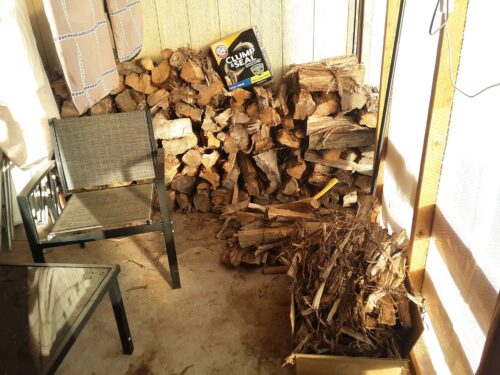
Hi, Phoenix here after some much-needed self-care. A few months ago, I went to a week-long work conference and stayed in a hotel. It was weird being back on the grid, and the sharp contrast between the hotel and the homestead brought some differences into sharp focus. I realized when on the grid, I feel so disconnected with nature, and it becomes more difficult to see how my actions are affecting the planet.
For example, due to the pandemic and the indoor conference setting, I needed to shower every day. I forgot to bring our homemade goat milk soap and shampoo, so had to use those from the hotel. The frequency of bathing and the harshness of the soap and shampoo led to dry skin and dry hair. This in turn increased my consumption of lotion and conditioner.
On the homestead, we need to pump water from the cistern into the house for bathing and have a hot water tank limiting the amount of hot water we can use at a time. In the hotel it was easy, and necessary, to take longer and hotter showers because of the hotel soap residue without realizing how many more resources I was using.
When I left the hotel room, I left one light on for safety, something I don’t feel I need to do at the homestead. When I came back, however, multiple lights had been turned on by the cleaning crew again increasing my energy consumption.
The conference location was chilly, so it was tempting and easy to keep the thermostat at a high temperature like a balmy 70 degrees because it did not directly correlate to the electricity or propane I was consuming. At the homestead, we have to cut up and haul wood into the house to produce heat, or see the propane heater turn on knowing we’ll need to buy more propane later. This reminds us to keep the house at a lower temperature and conserve resources.
On the homestead, we often use windows and their curtains to regulate the house temperature passively. This was not possible in the hotel where you cannot even open windows, making me rely more on the thermostat.
Staying in a hotel it was necessary to frequent restaurants or get take-out and use disposable, non-recyclable dishes. It was also tempting to use a grocery delivery service instead of walking to the store, which I thankfully resisted. These actions unfortunately increased my carbon, water, and energy footprint. Had I been on the grid in my own space, I could have reduced my footprint in some of the same ways I do on the homestead by opening windows, walking to stores, and taking advantage of reusable dishes.
Even though the conference related to climate change and sustainability, participants used disposable coffee cups/plates or plastic water bottles because of the convenience, with little attention paid to impact. This was distressing.
I was fortunate enough to share the hotel room with a friend and colleague most nights. However, on the nights I was alone, I gave in to the temptation of watching TV in bed late at night, which is not possible on the homestead because we’re on solar power. In addition to increasing my carbon footprint, this disrupted my sleep pattern, which I compensated for by consuming more coffee in disposable cups because the hotel did not offer reusable mugs in the room!
So, being in that hotel, there was so much temptation to slip back into major consumption and no longer pay attention to my carbon footprint or energy consumption. It made me realize how much more difficult it is to lower one’s footprint on the grid, taking much more foresight, planning, and resist easy temptations to use more resources. For those of you on the grid and still minimizing your footprint, I salute you!
Next blog post: Part 1: Zooming out to revisit the big picture of sustainability (by Phoenix)
